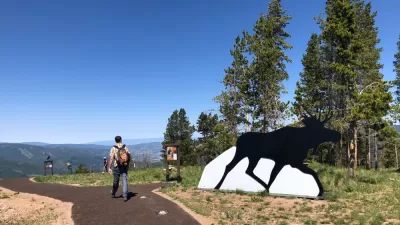The approval of the HOME law, S.100, will allow for duplexes in all residential neighborhoods in Vermont. Large swaths of residential zones in the state must also now allow tri- and four-plexes.

Vermont Governor Phil Scott this week signed S.100, legislation that will allow duplexes on all single-family residential zones and three- and four-plexes in all areas served by water and power. The bill positions Vermont among the first handful of states to implement state preemption of local control over zoning codes to roll back the effects of exclusionary zoning on housing costs and racial and economic segregation. Oregon was the first, followed by California, Washington, and Montana. Vermont’s approval of S.100 obviously shifts the state preemption movement farther east than it has yet reached so far (Connecticut’s 2021 zoning reform bill stopped short of state preemption).
An article by Lola Duffort for VTDigger provides details on the law the same day as Gov. Scott’s signing. Planetizen picked up news of the legislation as it worked its way through the Vermont Legislature in May. “The ‘Housing Opportunities Made for Everyone,’ or HOME, law will also make smaller, temporary reforms to Act 250, Vermont’s more than 50-year-old land-use law,” according to Duffort. “Several provisions, including new minimum density requirements, specifically apply to areas served by municipal water and sewer, and the bill’s proponents say they’re intentionally directing new housing into areas that are already developed to avoid sprawl.”
“The law also authorizes tens of millions in one-time spending on affordable housing construction,” adds Duffort. “But that money is tied up in the state budget, which Scott vetoed last week — over unrelated objections — and could be released once the Legislature either overrides the governor or writes a new spending plan to which he agrees.”
FULL STORY: Phil Scott signs ‘HOME’ bill, legalizing duplexes statewide and tweaking Act 250

Maui's Vacation Rental Debate Turns Ugly
Verbal attacks, misinformation campaigns and fistfights plague a high-stakes debate to convert thousands of vacation rentals into long-term housing.

Planetizen Federal Action Tracker
A weekly monitor of how Trump’s orders and actions are impacting planners and planning in America.

In Urban Planning, AI Prompting Could be the New Design Thinking
Creativity has long been key to great urban design. What if we see AI as our new creative partner?

King County Supportive Housing Program Offers Hope for Unhoused Residents
The county is taking a ‘Housing First’ approach that prioritizes getting people into housing, then offering wraparound supportive services.

Researchers Use AI to Get Clearer Picture of US Housing
Analysts are using artificial intelligence to supercharge their research by allowing them to comb through data faster. Though these AI tools can be error prone, they save time and housing researchers are optimistic about the future.

Making Shared Micromobility More Inclusive
Cities and shared mobility system operators can do more to include people with disabilities in planning and operations, per a new report.
Urban Design for Planners 1: Software Tools
This six-course series explores essential urban design concepts using open source software and equips planners with the tools they need to participate fully in the urban design process.
Planning for Universal Design
Learn the tools for implementing Universal Design in planning regulations.
planning NEXT
Appalachian Highlands Housing Partners
Mpact (founded as Rail~Volution)
City of Camden Redevelopment Agency
City of Astoria
City of Portland
City of Laramie





























